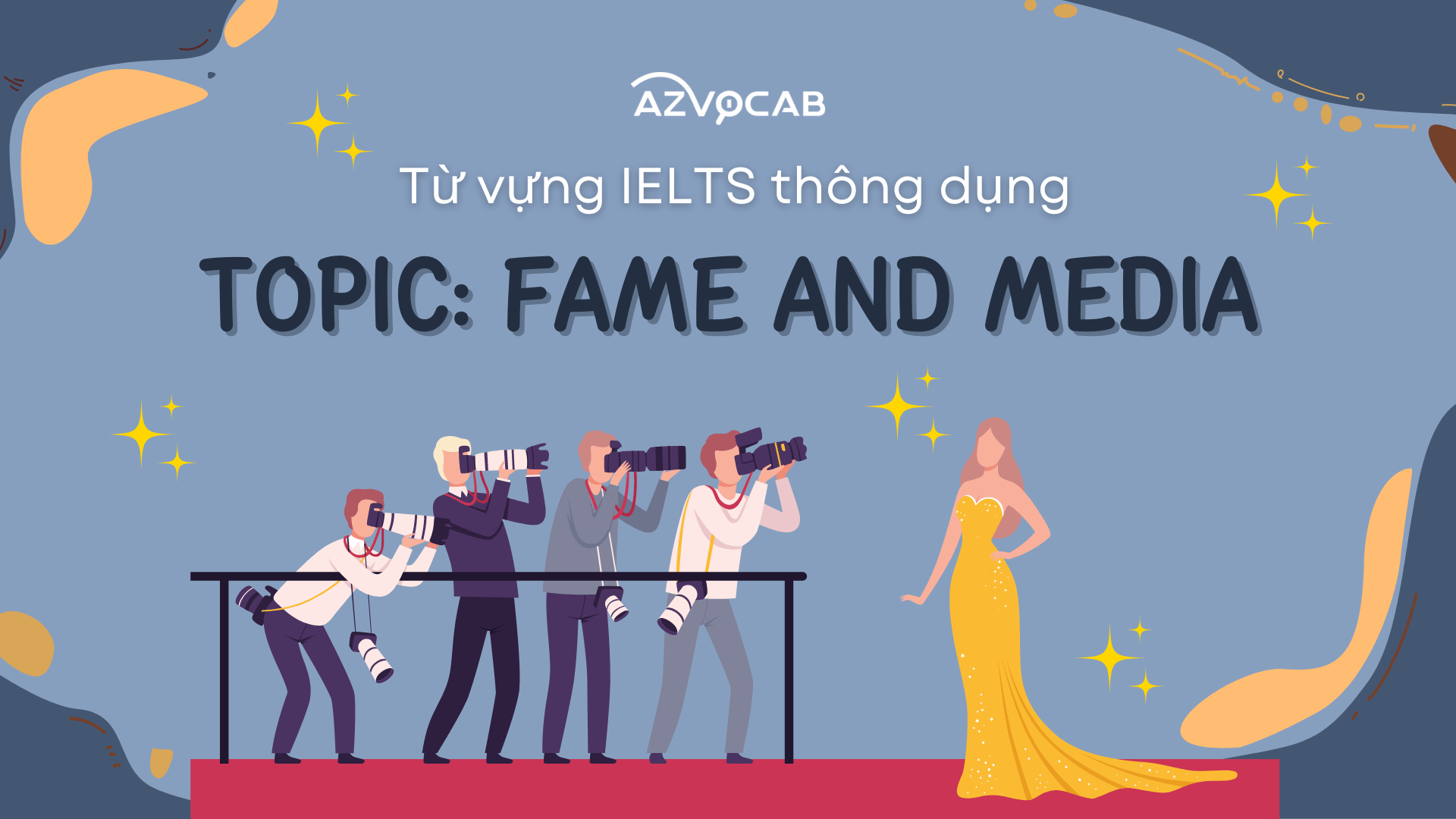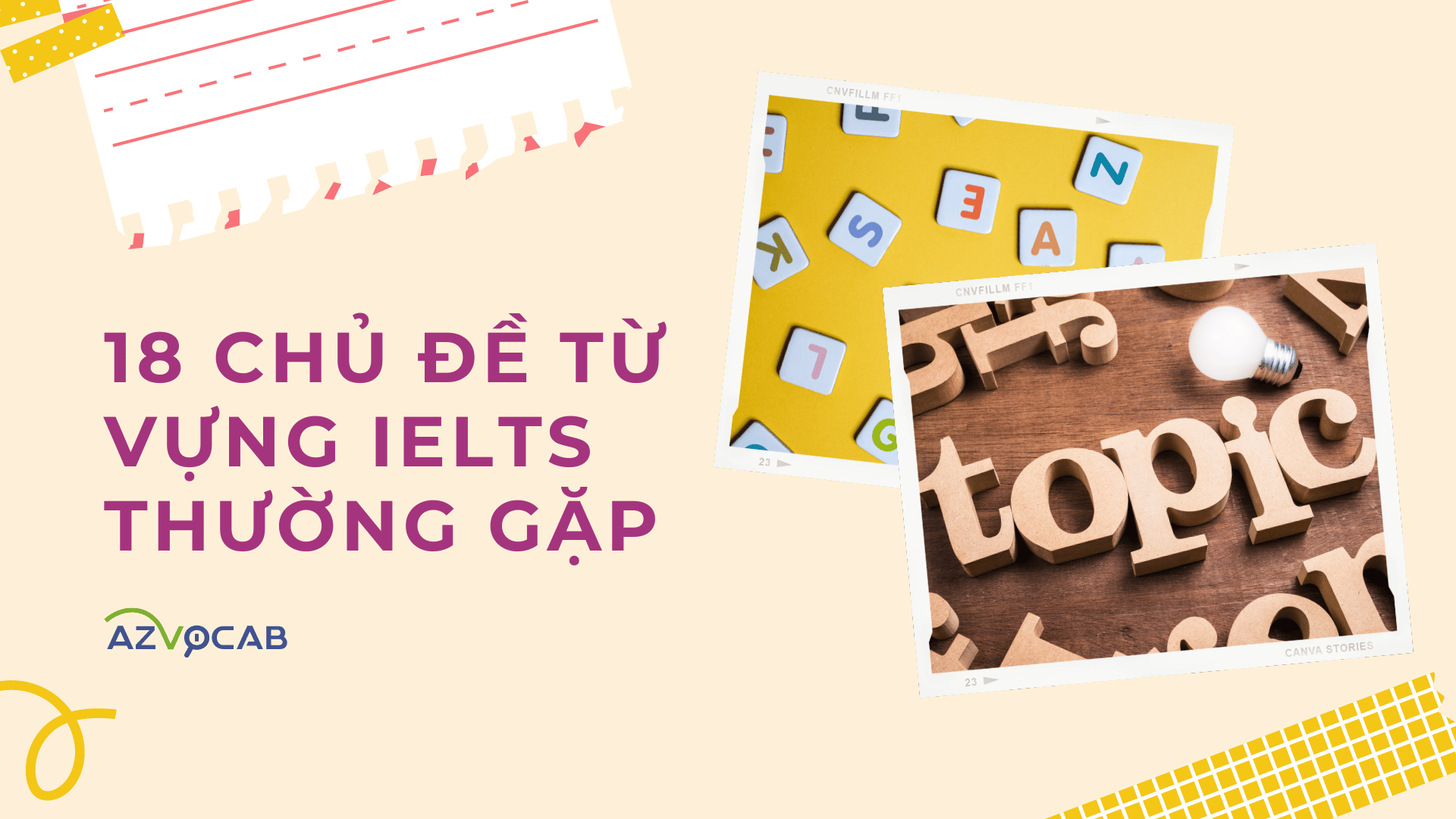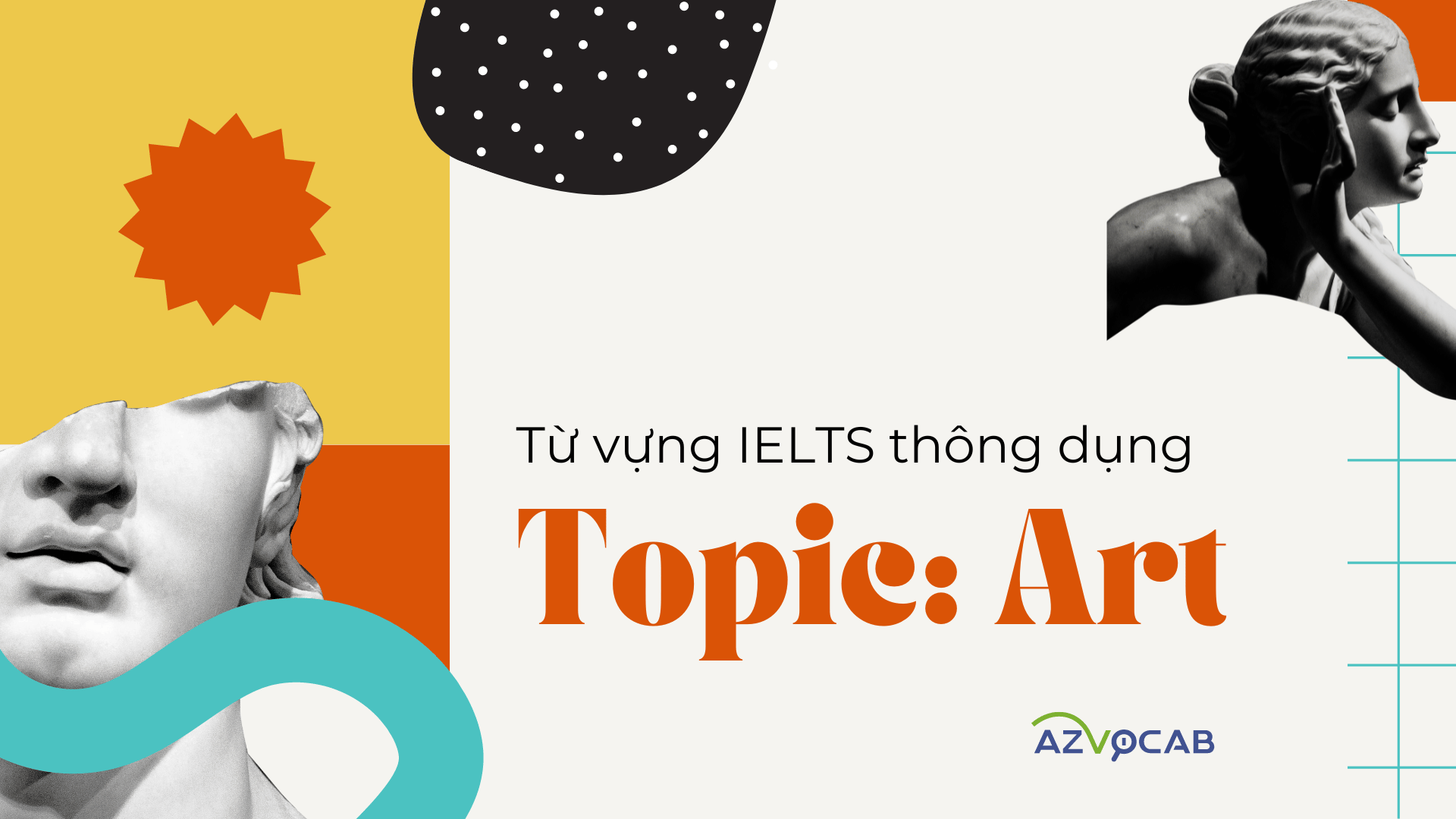50+ từ vựng chủ đề Fame and Media thông dụng cho kì thi IELTS
28 Tháng Mười Một, 2022Từ vựng IELTS thông dụng

Từ những bộ sách hay nhất cho việc ôn thi IELTS, azVocab đã tổng hợp được hơn 50 từ vựng phổ biến nhất thuộc chủ đề Fame and Media cho kì thi IELTS.
Các từ vựng này đều có thể sử dụng cho cả 4 kỹ năng Reading, Listening, Speaking và Writing. Những ví dụ được azVocab lựa chọn kĩ lưỡng trong từng ngữ cảnh cụ thể ở các bài thi IELTS. Điều này sẽ giúp các bạn biết cách sử dụng từ trong ngữ cảnh, tăng tính hiệu quả của việc học từ.
1. Từ vựng liên quan đến truyền thông
| broadcaster (n.) – người phát thanh | In television markets, for example, commercial broadcasters may be more likely to offer content designed to attract viewers deemed valuable to advertisers. |
| exposé (n.) – bản trình bày sự kiện | I believe there are many publishers and broadcasters that do still have a strong tradition of exposés and investigative journalism. |
| ideology (n.) – ý thức hệ, hệ tư tưởng | Fifteen years after the president embraced the ideology of privatization, the people were worse off than ever. |
| relevance (n.) – sự liên quan | The relevance of this novel to the current situation is striking. |
| artificial (adj.) – nhân tạo | Famous people’s lives seem to be very superficial because they spend all of their time going to parties and trying to look glamorous. It all seems very artificial to me – they just don’t seem to be part of the real world at all. |
| biased (adj.) – thiên vị | Baxter contends that, while the public’s attitude towards women in politics has evolved considerably, media coverage both on TV and in the press, has failed to keep pace and remains biased against them. |
| controversial (adj.) – gây tranh cãi | The ocean of digital information about us isn’t limited to likes and dislikes or opinions. Though it’s still controversial, and difficult to get hold of, some teams are accessing much more in the way of personal details. |
| distorted (adj.) – bị bóp méo | In my view, the inevitable home-town bias of local newspapers could give distorted views in terms of the number and length of particles they contain. |
| mainstream (adj.) – bình thường, thông dụng | In recent times we have seen evidence of this where paedophiles have been caught using peer-to-peer networks, bypassing mainstream networks to exchange files. |
| prejudiced (adj.) – có thành kiến | The media has been accused of presenting a prejudiced view of people with disabilities. |
| unbiased (adj.) – không thiên vị | Most people believe that this newspaper favours the government too much to provide unbiased coverage of the election. |
| universal (adj.) – thuộc thế giới | The most successful products in the world are those that have a universal appeal. |
| assert (v.) – xác nhận, khẳng định | The book begins by examining the stereotypes that the media ascribes to female candidates and asserts that, as well as portraying women as incompetent leaders, reporters also tend to describe them their according to their fashion choice. |
| broadcast (v.) – phát hành, phát tán, truyền đi rộng rãi | Our modern society often prides itself on its free press and, with access to the Internet and cable television the news is broadcast 24 hours a day. |
| censor (v.) – kiểm duyệt | And this would seem to be what tabloid journalism is doing. They are effectively censoring important news stories on the basis that they may not be interesting or entertaining enough. |
| ignore (v.) – phớt lờ, mặc kệ | We need to ignore all of the media hype and examine this problem carefully. |
| influence (v.) – ảnh hưởng, tác động | Some people think we are too influenced by celebrities these days. |
| publicize (v.) – đưa ra công khai | Many companies publicize themselves as ecotourism companies, but not all of them follow ecotourism principles. |
| publish (v.) – xuất bản | Alcott was still writing novels for girls, including two sequels to Little Women: Little Men and Jo’s Boys. The latter was published in 1886. |
| report (v.) – báo cáo | Social scientists have jong had to rely on crude questionnaires or interviews to gather data to test their theories and methods marred by reporting bias and small survey sizes. |
2. Từ vựng liên quan đến phương tiện truyền thông
| access (n.) – sự tiếp cận | From the very beginning of the Information Age, having immediate access to data was fundamental to progress. |
| censorship (n.) – sự kiểm duyệt; cơ quan kiểm duyệt | It would seem that the media today seeks to entertain rather than inform the public. I define censorship as anything which interferes with the free flow of information in our society. |
| conjecture (n.) – sự phỏng đoán | There’s been a lot of conjecture in the media recently about marriage. |
| exposure (n.) – sự phơi bày, bóc trần | The exposure of the politician’s love affair forced him to resign. |
| mass media (n.) – truyền thông đại chúng | The mass media is very influential in our society and has a big impact on young people. |
| media (n.) – truyền thông | It would seem that the media today seeks to entertain rather than inform the public. |
| network (n.) – mạng lưới | For this project we compiled a list of what we considered to be the most significant current affairs stories and then we assessed how these stories were reported by newspapers and radio and television networks. |
| publication (n.) – sự xuất bản, công bố | There is an enormous amount of alternative media that provide a healthy balance to the mainstream. If people want to be informed, they are unlikely to turn to tabloid newspapers to do so. Instead, they can access a wide range of journals, magazines and smaller publications. |
| publisher (n.) – nhà xuất bản | Whilst every care has been taken to ensure accuracy, the publishers cannot accept legal responsibility for any problems that arise. |
| safeguard (n.) – cái để bảo vệ | The safeguards in place for traditional media just don’t exist there at the moment. |
| speculation (n.) – sự suy đoán | There has been a lot of speculation in the media about the identity of the victim. |
| Web/website (n.) – trang web | To examine what made one song more successful than others, Watts and Salganik created a project called Music Lab. It featured a website where more than 14,000 people listened to songs by relatively unknown bands, rated them and downloaded them if they wanted. |
3. Từ vựng liên quan đến báo chí
| bias (n.) – thành kiến | Whoever controls the media also has ultimate control over what is published or broadcasted and what is omitted. They can also add a certain prejudice or bias to their coverage of certain news stories depending on their own feelings about the matter. |
| current affairs (n.) – tin tức thời sự | The volume of emails ranged from 5 to 25 emails per day depending on current affairs. |
| editor (n.) – biên tập viên | I was the editor of the student magazine for a while. People sent in all kinds of articles. I had to choose what to include and then put it all together. |
| free press (n.) – tự do báo chí, tự do thông tin | Our modern society often prides itself on its free press and, with access to the Internet and cable television the news is broadcast 24 hours a day. |
| headline (n.) – tiêu đề | Not every success story makes it into the headlines. |
| journal (n.) – tạp chí học thuật | One thing that helps me do that is to know what you’re doing in the classroom, so I require all my students to keep a journal about their teaching experience. |
| journalism (n.) – nghề báo, ngành báo chí | I define censorship as anything which interferes with the free flow of information in our society. And this would seem to be what tabloid journalism is doing. |
| news (n.) – tin tức | Nowadays we have access to the news 24 hours a day. |
| newspaper (n.) – báo | The study revealed that newspapers avoid reporting on the gap between the rich and the poor. |
| newsstand (n.) – quầy báo, tạp chí | These paperback novels were sold at newsstands and dry goods stores and succeeded in opening up the publishing market for both writers and readers. |
| opinion (n.) – ý kiến, quan điểm | You can control what is printed but you cannot control the opinions of your readers. |
| press (n.) – báo, tạp chí | This study seems to be rather a harsh attack on the press and I can’t agree with its conclusions. |
| tabloid (n.) – báo khổ nhỏ | Baxter’s study involved a detailed analysis of national broadsheets and one tabloid from each candidate’s local area. |
| informative (adj.) – có tính cung cấp thông tin | Titles should be brief, but informative, and should indicate the nature of the contents, not their import. |
| intrusive (adj.) – có tính xâm phạm | Being famous nowadays simply means that you’re in the tabloids a lot and you’re followed by the paparazzi everywhere you go. I’d find that very intrusive. |
| sensationalist (adj.) – giật gân | These sensationalist headlines give the impression that the sport is being corrupted on a day-to-day basis. |
| paparazzi (n.) – cánh săn ảnh | The paparazzi can create really dangerous situations just trying to get a photograph of whoever’s making headlines at the moment. |
| expose (v.) – phơi bày, bóc trần | The newspaper story exposed the actor as a liar. |
| intrude (v.) – xâm phạm, xâm nhập | Paparazzi and the press intrude too much into celebrities’ lives. |
| investigate (v.) – điều tra | Researchers may investigate several possible uses of a new drug. |
4. Từ vựng liên quan đến lĩnh vực giải trí & sự nổi tiếng
| author (n.) – tác giả | I’m reading a book about it actually and the author makes some very valid points. |
| celebrity (n.) – người nổi tiếng | Some personalities are good role models and use their celebrity status to encourage people to think about important issues, but we often see photos of famous people behaving badly. |
| episode (n.) – sự kiện | This latest episode in the fraud scandal has shocked a lot of people. |
| fame (n.) – sự nổi tiếng, danh tiếng | I want to read about people with real talent who’ve actually earned their fame because they are different from the rest of us. |
| gossip (n.) – lời bàn tán | But I suppose there’s a lot of demand for gossip about celebrities these days, especially in the tabloid press. |
| privacy (n.) – sự riêng tư | Famous people have no privacy at all in any part of their life. |
| publicity (n.) – sự chú ý | There has been a great deal of publicity about the new James Bond movie. |
| viewer (n.) – người xem | Millions of viewers will be glued to their sets for this match. |
| eminent (adj.) – xuất sắc, xuất chúng | She is an eminent psychologist who has won a number of awards. |
| entertaining (adj.) – có tính giải trí | As far as books go, I think light reading is very popular. People seem to be reading certain novels that are entertaining but not very deep. |
| fascinating (adj.) – hấp dẫn, lôi cuốn | Yet studying advertisements as historical sources can also be fascinating and revealing. |
| high-profile (adj.) – nổi tiếng, nổi danh, trứ danh | His high-profile clients include several supermodels. |
| prominent (adj.) – nổi bật, xuất chúng | Works by Alex Green, whose paintings depict the beautiful scenery this island is famous for, will be a prominent feature. |
| superficial (adj.) – nông cạn, hời hợt | Their life also seems to be very superficial because they spend all of their time going to parties and trying to look glamorous. |
| world-famous (adj.) – nổi tiếng khắp thế giới | We have main-line railways and a world-famous radio station. |
| invade (v.) – làm tràn ngập | Maria looks set to invade the music scene with her style and image. |
| overshadow (v.) – làm lu mờ | Karen has always felt overshadowed by her famous elder sister. |
Với những từ vựng thông dụng trên đây, hy vọng rằng các bạn sẽ có đủ vốn từ vựng để chinh phục chủ đề Fame and Media trong kì thi IELTS. Các bạn có thể xem thêm từ vựng cho các chủ đề khác qua bài viết tổng hợp từ vựng thông dụng kì thi IELTS theo 18 chủ đề thường gặp trên trang azVocab nhé.





